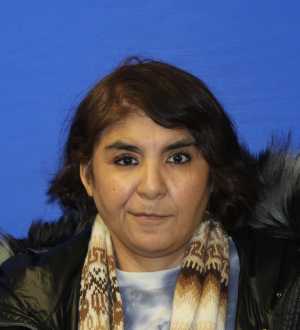Women in Antiquity
Course Info
Assignments
Content
Resources
Return to schedule of responses
Topic: Women and the Kingdom of Israel
Due: Sun April 13
Prompt: What do this week’s primary source readings tell us about ideas of gender in ancient Israel?
The documents for this week are:
For your online response this week, choose one of the primary source readings and write a post that includes the following:
- Which reading did you pick? If there’s a reason it interested you, what was it?
- What passage or detail in particular jumped out at you as you read through it?
- What do you think the author was trying to communicate?
- In your opinion, what is this document telling us about the time and place it comes from?
- What about this document seems to relate to, support, or even contradict our other readings about this time and place?
- What would you like to find out more about?
Responses for Week 10
The Book of Esther
 Emma Perez Sr
1385
Emma Perez Sr
1385
2025-05-02 01:49:37
I picked the “Book Of Ruth” , this reading interested me because of how women are portrayed. The details that stood out to me was Naomi losing her children and husband, feeling abandoned by God. Personally God is always presented in a positive light within humans so reading someone who felt bitter towards him was an interesting read because it gave a different point of view in religion and her emotions. I believe the author is communicating women overcoming hardships and how religion plays a role, even in hard times things do get better. Losing someone doesn’t have to dictate your feelings about everything and everyone. It also presents loyalty between two women. The document discusses a time and place where women took risks in their daily lives. This article relates to “The Book Of Esther” because they both empower women making an impact in religion and history. I would like to find out more about other similar stories to the “Book Of Ruth”.
Week 10: The Book of Esther
 Christopher Alvarado
1364
Christopher Alvarado
1364
2025-04-28 08:42:11
I selected the Book of Esther to read because I appreciate stories in which an individual must have use courage and cunning to survive either difficult situations; Esther's own example is one of great bravery and wisdom. A quote that stood out in particular was when Mordecai said to Esther, "Do not imagine a time is coming when, in the palace of the king, you as one Jew among many more than everyone else'll get off unscathed"; At this point we can see that even if you are close to power, you still are not safe when the injustice occurs- just silent. I think that the author wished to express how it is important to act when most needed; Esther’s choice to risk her own life in order look after others she knows speaks loudly for both conscience and courage during times of danger. The story presents a world where the laws were rigid and you seemed to have power only if you were a king or high official; but through determination as well as clever choices Esther could alter fate for many. This is connected to other readings that show even those considered helpless later in their stories found ways of influencing history; here we see loyalty and cunning combined to produce powerful results in an age of tamed people It would be interesting to know more about how this particular story has shaped things like Purim over the years; one would be able gain insight into the enduring nature and spiritual effects of that great legacy.
The Book Of Esther
 Nalu Cabrera
1337
Nalu Cabrera
1337
2025-04-23 22:11:04
Hello Professor and Classmates,
I chose to read the Book Of Esther because I was curious about the role of women in ancient religious texts, and Esther’s story stood out as one where a woman plays a key role in saving her people from what she felt was wrong. A part of the story that specifically caught my attention was when Esther decided to approach the king without being told to come, something that could’ve gotten her killed because you aren't allowed to do that. That part of the story shows just how much courage it took for her to stand up for what was right, to help her people. In my opinion, the author wanted to highlight how faith, intelligence, and courage can make a real difference, even when the odds are against you. This story also gives us an insight into the Persian Empire and how power and politics worked, especially when it came to women and minority groups like the Jews. Compared to other ancient texts that mostly focus on male figures Esther is unique because a woman drives the entire plot. It makes me want to learn more about how women’s roles were viewed in other biblical stories and how those views may have shaped society back then.
The story of Ruth
 Veronica Castaneda
1329
Veronica Castaneda
1329
2025-04-20 22:09:43
The passage or detail that jumped out as I was reading was in Chapter 3 is when "Naomi tells Ruth to bathe, and anoint herself and put new garments on her. To go down to the threshing floor , not to let herself be known to the man until he completes to eat and drink, when it comes to pass, when he lies down, that Ruth have known the place where he lies down, and have gone in, uncover his feet and lain down-and he declares to you which you do; and she says to Naomi, All you say-I do."
The book of Ruth emphasizes God's redemptive faithfulness and the inclusion of gentiles into his covenant community. Ultimately accentuating the lineage of Jesus Christ. It reveals how God works through the ordinary people in their daily lives. Emphasizing love, loyalty, and obedience. The story of Ruth a Moabite who chooses to follow Naomi's God and family, shows God providential care and the transformative power of faith.
The message of this story of Ruth in the Bible is that God's grace and provision can be found in the most difficult circumstances and that faithful, humble, and diligent service can lead to unexpected blessings.
The book of Ruth encourage readers to view our day to day lives as part of God's bigger plan. The book of Ruth is one of my favorite biblical story.
Week 10 Response
 Kujege Thiam
1325
Kujege Thiam
1325
2025-04-14 20:40:06
The Book of Esther stood out the most to me out of this weeks readings. I in particular found interesting the role of Queen Vashti, and how she refused to join the banquet. I understand that this is used in the Bible to further elevate Ruth's patience, and show how her ability to be wise and crafty helped her in the end. I find the messaging to be very odd. Queen Vashti was "disobedient", but she was also modest hence the reason she didn't want to join the banquet. She refuses because she knows her husband is asking her to flaunt her beauty, and her humility is the reason she doesn't. It feels as though she's punished for that, rather than any perceived "disobedience". I wonder how women of that time would have responded to this kind of messaging? It's okay to be deceitful so long as it's for a greater purpose, and also disobeying your husband or king is always wrong even if it comes from a place of humility or modesty? I think this is one of many examples in the ancient world where women can't really win.
The Book of Esther
 Melvin Beltre
1320
Melvin Beltre
1320
2025-04-13 22:30:17
I decided to read The Book of Esther. Truly, what interested me was the courage of Esther. What jumped out to me was Esther’s courage when she pleaded to the king to stop the mass killing of her fellow Jews. The author, through the test, was possibly trying to communicate Esther’s strength and courage. She was the only person to try to speak to the king about something that was happening when she understood she could have gotten beheaded then and there. Still, she cared so much for her people that she was willing to risk her life. Clearly, the time and space of this reading seem to direct very close and tight public opinions where speaking out can cause problems, as we saw with Esther, where one single word that could trigger an outrage could end her life. So, speaking out of line can cause a problem. The reading here seems to contradict other readings, as I feel like in past readings, I was urged to ignore women's pleas as they were “evil,” but in this reading, it was the opposite, and I chose to listen.
My question is, just as Esther has, has there been a woman in history to do the same thing she has done or something similar, and were the consequences much different from hers?
Response for Week 10
 Dania German
1318
Dania German
1318
2025-04-13 22:08:40
I chose to read Esther because I was specifically interested in the way it looks at power, gender, and resistance. A scene that stuck out to me was when Queen Vashti refuses to appear before King Ahasuerus in order to show him her beauty. Her act of disobedience, though one that leads to her exile, is something that strikes me as passive rebellion in a society where women were expected to comply without question. It showed her resilience was powerful since women at the time would never deny King Ahasuerus anything.
The author seems to be showing how ordinary actions, especially by women, can disrupt existing powerful systems. Esther then does the same thing but in a different manner, using her position, patience, and courage to save her own people. Both women challenge expectations but in contrast. The author shows two very dissimilar forms of resistance in Vashti and Esther. Vashti disrupts the order by defying the king's command outright, she says no in public, which is confrontational and courageous. Her defiance thus causes panic among the men who are in power, fearing that other women will be similarly empowered. Esther, approaches the system more strategically. Instead of rebelling against the king outright, she uses her intelligence, beauty, and royal birth to gain favor and recognition. She builds trust and bides her time to speak up, risking her life to request safeguarding for her people. Vashti's rebellion is dramatic and obvious, Esther's is strategic and subtle. Both defy what's normative of women in their culture, but each in different ways: one in raw refusal, the other by persistent persuasion.
This passage gives us a clear glimpse of the Persian Empire's strict structure which was hierarchical, patriarchal, and appearance-driven. Compared to other readings, this one stands out for how it places a woman at the center not just as a character in the background, but as a political agent.
I’d like to learn more about how this story was viewed historically, was it seen as empowering for women, or just a religious tale? And how has that perception changed over time?
The Book of Esther
 Arlene Willock
1310
Arlene Willock
1310
2025-04-13 09:45:12
The reading that I pick was Esther, It's interesting to me because of the way she choose to save her people from the genocidal plot and kept her true identity a secret. The way Esther let the king know her true id and let the king now that she would expose Haman plot to execute all the Jews at the festival of Purim, which shows of her divine faith and how well their fight against oppression for survival.
The detail in particular that jumped out to me is in chapter four when Mordecai says to Esther who knows but if you keep entirely silent at this time, respite and deliverance remains to the Jews from another place and you and the house of your fathers are destroyed and who knows whether for a time like this you have come to the kingdom. Mordecai is saying that Esther is in the right position to help her people the most and Esther embrace the power as the queen.
The Author is communicating the courage and quite strength Esther have in a political tension inside the palace.
In my opinion this document is telling us about the strong sense of time when the Jewish people were outsiders in the Persian empire that they were not in control of their own lands and laws having to keep their identity hidden, also about fear of been silence.
What I would like to find out more about is how did the Jewish community received the story over the years and was it different from the biblical text and how was the Persian court life portrayal and the king did not now about the woman that he was marrying background and how they see Esther a symbol of quiet strong or reluctant hero.
Response for Week 10
 Francisco Baez
1308
Francisco Baez
1308
2025-04-12 20:55:41
I have chosen the Book of Ruth, an ancient text that profoundly illustrates gender roles and relationships in Israelite society. I was particularly drawn to Ruth's unwavering loyalty and agency, which challenges conventional gender norms of her time. A passage that resonated with me is Ruth's pledge to Naomi: “For where you go, I will go, and where you lodge, I will lodge; your people shall be my people, and your God my God” (The Holy Bible, 2020, Ruth 1:16, p. 531). This declaration not only highlights her commitment but also her active choice to embrace a foreign culture, defying the passive roles typically assigned to women.
The author seems to communicate the significance of female solidarity and the power of choice in a patriarchal context. Ruth's decision to accompany Naomi back to Judah underscores the crucial role women played in navigating social networks for survival. This document suggests that, while men held formal authority, women's decisions significantly impacted community dynamics and familial structures during this period.
In comparison to other readings from this era, such as those depicting female figures in competition for male approval, Ruth's story embodies collaboration and mutual support. It aligns with texts that highlight women's roles in sustaining family lineage but contrasts with narratives that render women invisible outside their relationships with men. I am eager to learn more about the historical context of Moabite women and how their representation in this text compares to other ancient Near Eastern cultures.
Ultimately, the Book of Ruth offers a nuanced understanding of gender, loyalty, and identity, inviting readers to reconsider the complexities of women's roles in ancient societies. It challenges us to reflect on how these themes resonate in contemporary discussions about gender and agency.
Reading Response #10 Book of Esther
 Brenda Rodriguez Aguilar
1303
Brenda Rodriguez Aguilar
1303
2025-04-10 19:18:27
Good Evening Everyone
Which reading did you pick? If there’s a reason it interested you, what was it?
I really like both stories so It’s really hard for me to pick one but I would say the Book of Esther caught my attention. I was so amazed by the cleverness and brevery of Esther. Also I really like how God is never mentioned but is present in mostly all the chapters. I also like how the Jewish did not purely rely on God and praying but to take actions.
What passage or detail in particular jumped out at you as you read through it?
The passage that caught my attention was how delicate and with admiration Esther talk to the King like in the following quote “If I have found grace in your eyes, O king, and if to the king [it be] good, let my life be given to me at my petition, and my people at my request; 4 for we have been sold, I and my people, to cut off, to slay, and to destroy; and if for menservants and for maidservants we had been sold I had kept silent—but the adversity is not equal to the loss of the king.” I think the way Esther acted was so kind and sweet to the King was pleased to give her anything.
What do you think the author was trying to communicate?
I think he wanted to portray women’s importance in the Jewish religion and stories. As well as shows the resilience and the union of the Jewish community.
In your opinion, what is this document telling us about the time and place it comes from?
I think it is very inclusive of the role of women and men in the public sphere and I’m so curious to know if ever come back to be like that because in my secondary source the women had so many limitations that weren't shown in these both stories.
What about this document seems to relate to, support, or even contradict our other readings about this time and place?
I like that Esther’s cleverness and intelligence is portrayed as a good for the community (Jewish) because mostly all the readings portrayed women as evil humans, doing unforgettable things, so I like how the story is different in that aspect.
What would you like to find out more about?
I would like to learn more about the Jewish culture, roles and traditions. How much does it change the role of women in more advanced times? Maybe a comparison with recent time.
Book of Esther
 Jairo Diaz Rodriguez
1300
Jairo Diaz Rodriguez
1300
2025-04-08 19:45:24
I found the narrative in the Book of Esther to be styled more as a moral and cultural lesson rather than a strictly historical account. The narrative condemns toxic masculinity through Haman’s arrogance. His decision to annihilate the Jews stems not from political necessity but wounded pride after Mordecai refuses to “bow nor pay respect” (Esther 3:2). This petty grievance spirals into genocide, illustrating how unchecked male ego destabilizes justice. The king’s eventual decision to have Haman executed on the very gallows “he had prepared for Mordecai” (Esther 7:10) reinforces the story’s message that toxic pride ultimately leads to self-destruction.
The text emphasizes the ritualized control of female agency through practices like the “six months with oil of myrrh and six months with perfumes” (Esther 2:12) required for women to be deemed “purified” enough for the king’s approval. I like how Esther disrupts these gendered dynamics. Her bravery in risking her life to confront the king (“if I perish, I perish,” Esther 4:16) resonates with my rebellious spirit and commitment to principles. It was equally compelling to see Mordecai follow Esther’s orders to “gather all the Jews… fast for me, and do not eat nor drink three days, by night or by day” (Esther 4:16).
RE: Book of Esther
 Brenda Rodriguez Aguilar
1306
Brenda Rodriguez Aguilar
1306
2025-04-11 21:18:44
Hello Jairo,
I agree with you on the way you pointed out Esther's agency as well as her bravery and cleverness. I also disagree in the part that you view this story as moral and cultural because I also believed portrayed the story of the Jewish Community, their resilience and the way they were exile from many places through history.
Responses for Week 10
 Jenisis Ayala
1295
Jenisis Ayala
1295
2025-04-08 19:07:46
One part that stands out in the story is Mordecai's wonderful way of talking with Esther, "Maybe you became Queen for just such a time," spoken to her in Esther 4:14. This really highlights Esther's significance. Not only for herself but for her whole community too. I believe the author meant to show that women don't have much power very often, but really great ones can have a huge effect if they are smart and brave. And the story of women in ancient Israel as well as in Persia often is one of being bound by strict rules but sometimes using the positions we occupied lovingly to help others. While many other stories involve women with less power, Esther differentiates because she is the hero who rescues her people.
I'd love to learn more: was the impact on real women at that time greater, or was Esther's story more legendary?
A standout for me is when Ruth tells Naomi out loud, "Where you go I will go, and where you reside I will remain" (Ruth 1:16). Ruth's loyalties to Naomi really shine through strongly. I think the author meant to emphasize how important kindness, loyalty, and family really are even when times fall hard. This document lists traits that women should display in ancient Israel: loyalty, solid work ethic, and devotion to family. Stories of Ruth show that these virtues are especially critical for survival and to maintain connections. Compared to other stories, Ruth displays both that women were seen for loyalty and ability to look after others and also demonstrates what strong, brave women can be.